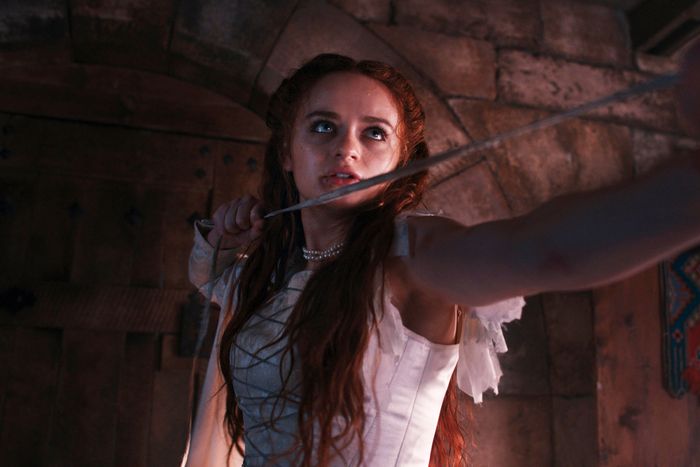Joey King is credible and compelling as a vengeful would-be princess bride in this over-the-top action fantasy tale.
The Princess is an action movie whose premise achieves such deranged heights of cynical pandering that screenwriters Ben Lustig and Jake Thornton must have exchanged windmill high fives after coming up with it. Its main character, played by Joey King, is the daughter of the king (Ed Stoppard) in a fairy tale-esque kingdom that seems to consist mainly of a tower overlooking the sea. When she turns down the marriage arranged between her and a lord named Julius (Dominic Cooper), Julius decides to change her mind by force, seizing the castle and taking the royals captive. But the Princess, who’s never given a name beside that, has been conveniently trained in martial arts, and rather than being dragged in chains to the altar, she’s soon punching, kicking, and slashing her way from floor to floor in an attempt to save her family and, on the way, prove to her father than he doesn’t need a male heir to pass leadership onto. It’s as though The Raid were given a concussive head injury and a membership to the Wing.
What the fuck is it with princesses, anyway? The smugness with which The Princess presents the spectacle of a 110-pound woman in a poofy dress running through passable fight choreography is enough to make you wonder whether anyone involved in the movie has paid any attention to the last few decades of pop culture (or watched a Joss Whedon show). Princesses kick ass now — they lead the way, they save the day, and they’re also still traditionally beautiful and feminine and lithe, the latter point hammered home in this new movie by a belabored fat joke. The princess has been a revisionist figure for so many years now that we’ve lost the idea that one of the role’s few defining qualities, aside from class, is a lack of agency, especially when it comes to matrimony. Our attachment to this increasingly vague concept, fueled heavily by Disney’s branding and the eternal appeal of a flouncy frock, has landed us in the empowerment dead-end of The Princess, whose main character attempts to prove that women are just as deserving as men when it comes to inheriting power due entirely to the circumstances of their birth.
King, with her Kewpie doll face and increasingly shredded medieval wedding gown, is a game action hero if not a notable one. The Princess would clearly like to be seen in the bruising recent tradition of David Leitch–adjacent movies like the John Wicks, Atomic Blonde, and Nobody, but is more slapdash in its construction, striving for longer takes while pulling its punches in combat. It feels rushed, which it probably was — Vietnamese American director Le-Van Kiet has already had two other movies in theaters this year, the horror movie The Ancestral and the Alicia Silverstone shark attack thriller The Requin. He’s best known for the 2019 gangster drama Furie, and here enlists that movie’s star, Veronica Ngo, to play Linh, the student of the king’s advisor Khai (Kristofer Kamiyasu). The king, it’s explained, has always opened his doors to “outsiders,” something Julius sneers at as weakness, though the xenophobia is as half-assed a marker of villainy as the aristocratic acceptance is a show of largesse. Linh and Khai are there to partake in the time-honored cinematic tradition of affirming the dominance of a white person at Asian fighting techniques. When the princess bests Khai in a skirmish, he intones that she “has a warrior’s heart,” and ceremoniously presents her with the sword she goes on to use to skewer various henchmen.
So why can’t I stop thinking about this dumb elevator pitch gag of a movie? Its empty girl power aesthetic has the quality of an intrusive thought. Like something out of a time capsule cracked open too early, The Princess is an artifact of girlboss feminism that retains no resonance, but that’s also not distant enough to have curiosity value. As its protagonist pares her voluminous outfit down to a battle corset and fluttering skater skirt and yelps about how she’s “not a piece of property to be traded,” the movie’s rote commodification of oppression as a series of catchphrases makes its arrival during a time of genuine misogynistic national crisis exquisitely painful. There’s so much to be angry about right now, and anger can be cathartic to witness and, when shared, can feel like an outstretched hand. Or, in the case of The Princess, it can be turned into an affirmation of the current order, which is apparently perfectly fine aside from the need for a lady royal atop the throne of whatever theme park monarchy the movie’s barely managed to come up with. It turns rage into a joke, allowable in its eyes because it assumes that equality is secured and can be taken for granted.

